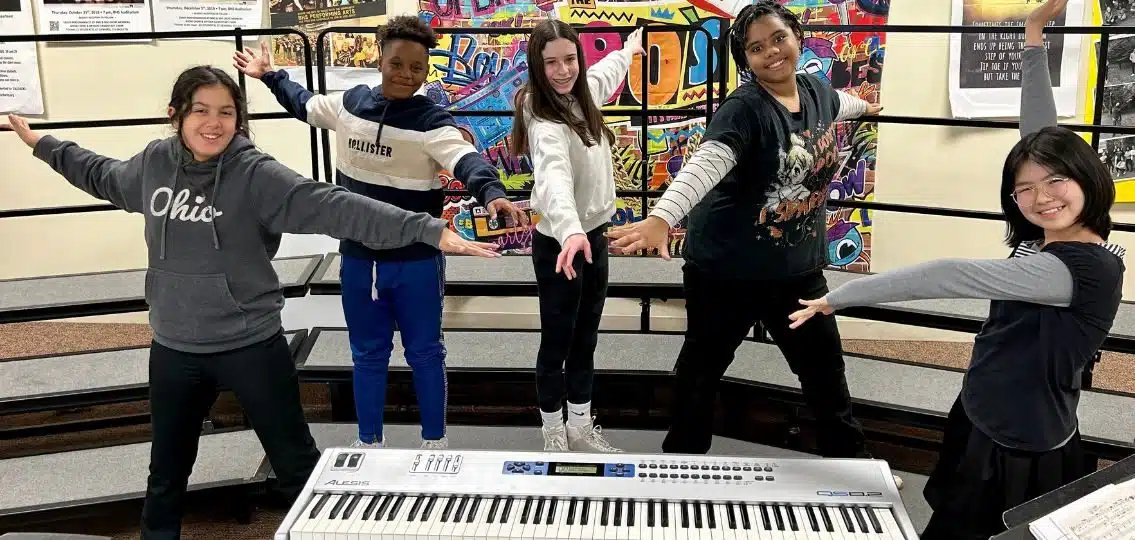A decade ago, our kids watched Frozen, and we spent the next year listening to them belt out “Let It Go” on repeat. Now, choir teachers in Beachwood, Ohio use that anthem of self acceptance to help teenagers in Ohio let go of their anger and fear.
How this all came about is, well, kind of magical. During the pandemic, the choir director for Beachwood schools, Darlene Haight, was attending teaching seminars where the buzz phrase on everyone’s lips was “social-emotional learning.” Why is social-emotional learning important? The idea was to think about how to get students to worry less and choose to be happy in less than ideal circumstances. Haight wanted to employ that concept with her choir students, who needed a boost in confidence and some lessons in teamwork, but she wasn’t sure how. When she mentioned her idea to vocal coach Adina Bloom, Bloom revealed she was a social and emotional consultant, and it was like all the stars aligned.
Haight and Bloom developed a program aptly called M.U.S.I.C. and they use anthems like “Let It Go” as part of the curriculum. They also include journaling, art, song-writing, STEM, breathwork, dialogue, and reframing to teach their students valuable social-emotional skills they can use in the classroom and later on in life.
The Power of M.U.S.I.C
Beachwood’s innovative M.U.S.I.C. program takes the approach that teaching students social-emotional skills helps them respond to situations appropriately and constructively rather than react from a place of assumptions and fear.
They have designed the M.U.S.I.C. program that places creativity and group dynamics at center stage. Here are some of the program’s curricular goals:
- Help students express their emotions and build relationships.
- Provide a supportive climate for making intelligent choices during choir practice.
- Teach teens to break down assumptions and introduce a safe space for singing.
- Counteract negative societal pressure and tensions in the classroom.
How M.U.S.I.C Works
Beachwood’s M.U.S.I.C. acronym stands for Music, Understanding, Success, and Informed Choices. Sixteen components go into the program, each with a different objective and all of them aiming to get students involved. Here are some of them.
One component shows teens it’s okay to make mistakes and it teaches teens to edit preconceived assumptions they have about themselves, others, and the world around them. Bloom says, “I’ve come into class and observed kids making the assumptions: ‘I’m going to look foolish’ or ‘I’m not good enough.’ But when they know they’re with a group of people that support and won’t tease them, then they are able to take risks and sing louder.”
To obliterate the assumption that “I can only feel good about myself, if I make you feel bad about yourself, ” another component teaches students how to give and receive compliments.
Another component asks the students to create a class cheer at the beginning of the year, which they then perform before concerts, using it as motivation.
A fourth component introduces a brief video at the start of class where the teacher states the antithesis of what they want the students to understand. For instance, they might say, “I never make choices. Things just happen to me.” Then students respond by journaling to get to the bottom of the statement’s truth, and through discussion, they explore different types of choices they can make, both difficult and easy.
Another component teaches compromise. Haight says, “I see how they are working out an argument they may have had at the beginning of the year. Now they’re singing on the risers, like buddies again.”
Celebrating inclusivity and promoting self-acceptance are also part of the program. Students create slide presentations talking about their heritage and traditions. “It has been a great way to celebrate our similarities as well as our differences,” Bloom says.
M.U.S.I.C. Lessons Outside of School
“I never thought in a million years that I’d have enough courage to stand on stage and sing, but you gave me the strength to do so by showing me a path to success and happiness … and by (encouraging me) to strive to achieve my personal best,” says a student, one of the many who have benefited from Beachwood’s M.U.S.I.C. program, applying what they learned inside the school walls to their lives outside.
Haight says, “As we’re going through each unit, their confidence levels build, they’re less afraid to take risks, and they continue to develop the relationships we have in the classroom, out in the community.”
Bloom says beyond just a school curriculum, the M.U.S.I.C. program helps these kids grow into empathic adults by learning to “build a loving family, which builds a loving community, which grows into a country that develops institutions based on these choices, ultimately leading to the kind of loving, high-functioning world we all hope for.”
Beachwood’s M.U.S.I.C. program’s emphasis on social-emotional development through music education not only benefits the students’ individual growth, but also has potential to contribute to the creation of a more compassionate and understanding society. By instilling empathy and promoting positive values, M.U.S.I.C. shows how we can use creativity to make a meaningful impact on the future of our communities and our world.
FURTHER READING:
To read more about how partaking in the arts benefits your teen, check out:
https://yourteenmag.com/family-life/communication/make-your-voice-heard
Learn why connecting through music is a great parenting tool:
https://yourteenmag.com/family-life/communication/connecting-through-music
Before your child quits their music lessons, you’ll want to check out our advice:
https://yourteenmag.com/family-life/communication/should-kids-quit-music-lessons




